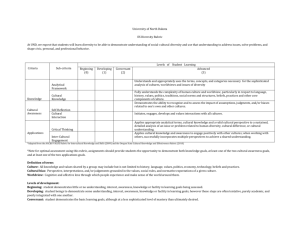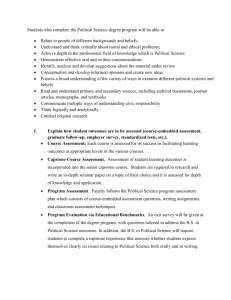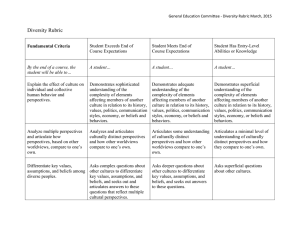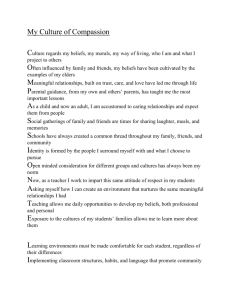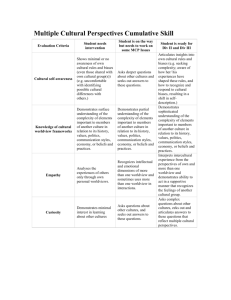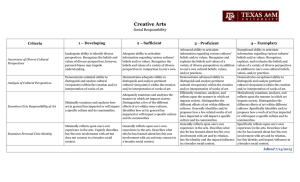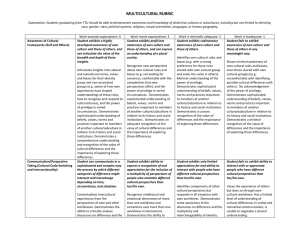Integrated Core Learning Outcomes
advertisement
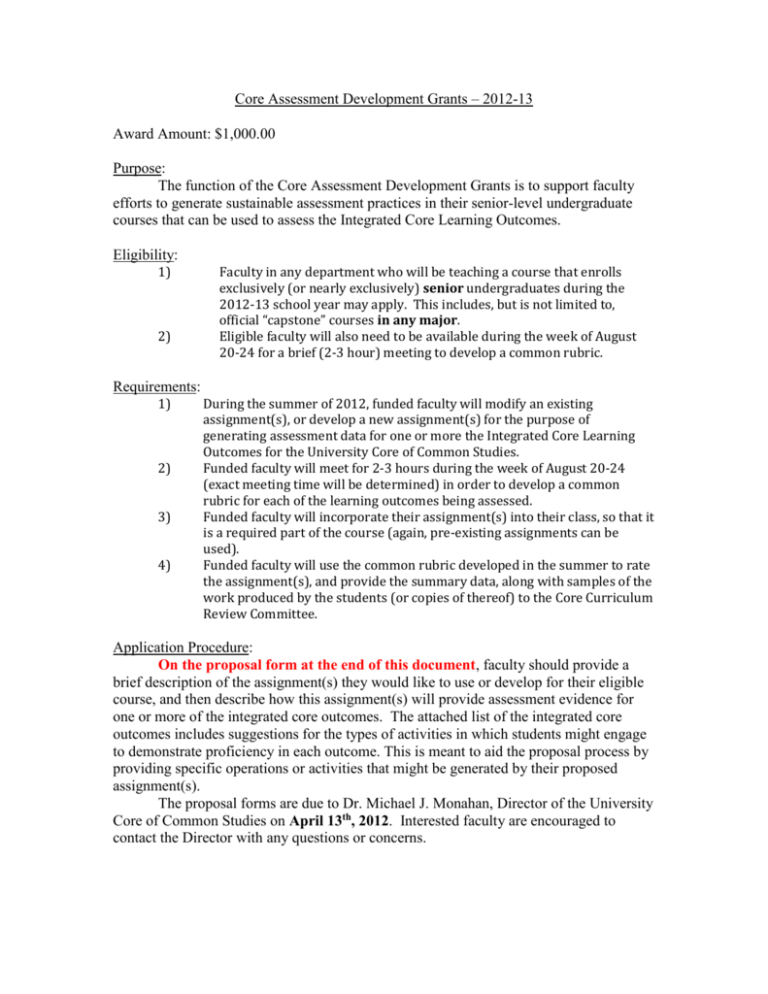
Core Assessment Development Grants – 2012-13 Award Amount: $1,000.00 Purpose: The function of the Core Assessment Development Grants is to support faculty efforts to generate sustainable assessment practices in their senior-level undergraduate courses that can be used to assess the Integrated Core Learning Outcomes. Eligibility: 1) 2) Faculty in any department who will be teaching a course that enrolls exclusively (or nearly exclusively) senior undergraduates during the 2012-13 school year may apply. This includes, but is not limited to, official “capstone” courses in any major. Eligible faculty will also need to be available during the week of August 20-24 for a brief (2-3 hour) meeting to develop a common rubric. Requirements: 1) 2) 3) 4) During the summer of 2012, funded faculty will modify an existing assignment(s), or develop a new assignment(s) for the purpose of generating assessment data for one or more the Integrated Core Learning Outcomes for the University Core of Common Studies. Funded faculty will meet for 2-3 hours during the week of August 20-24 (exact meeting time will be determined) in order to develop a common rubric for each of the learning outcomes being assessed. Funded faculty will incorporate their assignment(s) into their class, so that it is a required part of the course (again, pre-existing assignments can be used). Funded faculty will use the common rubric developed in the summer to rate the assignment(s), and provide the summary data, along with samples of the work produced by the students (or copies of thereof) to the Core Curriculum Review Committee. Application Procedure: On the proposal form at the end of this document, faculty should provide a brief description of the assignment(s) they would like to use or develop for their eligible course, and then describe how this assignment(s) will provide assessment evidence for one or more of the integrated core outcomes. The attached list of the integrated core outcomes includes suggestions for the types of activities in which students might engage to demonstrate proficiency in each outcome. This is meant to aid the proposal process by providing specific operations or activities that might be generated by their proposed assignment(s). The proposal forms are due to Dr. Michael J. Monahan, Director of the University Core of Common Studies on April 13th, 2012. Interested faculty are encouraged to contact the Director with any questions or concerns. Integrated Core Learning Outcomes Core Outcome: 1. Apply the perspectives, concepts and traditions of multiple disciplines to personal, professional, intellectual and societal challenges. Students can demonstrate outcome in a capstone task or assignment that requires the ability to do one or more of the following: A. Independently synthesize or draw conclusions by combining examples, facts, arguments or theories from more than one field of study or perspective. B. Adapt and apply skills, abilities, theories or methodologies gained in one situation to new situations to solve difficult problems or explore complex issues in original ways. C. Demonstrate the ability to problem-solve: Use information from diverse sources to understand a problem, generate alternative solutions, evaluate the strengths and weaknesses of alternatives, implement solution, evaluate outcomes. Core outcome: 2. Communicate in modes appropriate to various subjects and diverse audiences. Students can demonstrate outcome in a capstone task or assignment that requires the ability to do one or more of the following: A. Deliver an oral presentation that is clearly organized, in language appropriate to the audience, with effective delivery techniques, using credible supporting material, and conveying a clear central message. B. Produce written communication that demonstrates understanding of context, audience and purpose; develops content; demonstrates consistent use of important conventions; uses credible and relevant sources; and exercises control of syntax and mechanics. C. Produce a presentation using other media that demonstrates mastery of subject matter, originality, a logical flow of information, technical sophistication. D. Interpret information presented in mathematical form; make judgments and draw appropriate conclusions based on the quantitative analysis of data; communicate results using a variety of mathematical representations, including graphs, charts, tables and models; express quantitative evidence in support of the argument or purpose of one’s work. Core outcome: 3. Pursue an integration of knowledge into a comprehensive, transcendent vision of life. Students can demonstrate outcome in a capstone task or assignment that requires the ability to do one or more of the following: A. Identify assumptions and implications of different ethical perspectives; state an ethical position and effectively defend it. B. Articulate the relative merits of two different methods/practices/approaches used in a discipline or field in light of their consequences nationally, globally or on the environment. C. Discuss and analyze core beliefs and the origins of one’s core beliefs. D. Review prior learning to reveal significantly changed perspectives about educational and life experiences, which provide the foundation for expanded knowledge, growth and maturity over time. Core outcome: 4. Act as responsible members of the global human family, with knowledge of, and respect for, individuals and cultures in their diversity. Students can demonstrate outcome in a capstone task or assignment that requires the ability to do one or more of the following: A. Articulate insights into own cultural rules and biases; how to recognize and respond to these biases, resulting in a shift in self-description. B. Demonstrate understanding of other cultures, including their history, values, politics, communication styles, economy, beliefs and practices. C. Ask complex questions about other cultures and conditions (i.e., poverty); seek out and articulate answers to these questions that reflect multiple cultural perspectives. D. Demonstrate evidence of adjustment of one’s own attitudes and beliefs as a result of working within and learning from diversity of communities and cultures. E. Provide evidence of experience in community engagement activities and describe what he/she has learned about him or herself as it relates to a sense of civic identity and continued commitment to social justice. Core Assessment Development Grants Proposal Form Course Number and Title: Anticipated Enrollment: Faculty Name: Department and College: Which of the four Integrated Learning Outcomes do you believe you will be able to assess in your course? Please list the number(s) and letter(s) from the list above. Describe briefly of the kind of assignment(s) you would like to use (this could be an existing assignment or a newly designed assignment) for this assessment: Please return by April 13th to Michael Monahan, via email at michael.monahan@marquette.edu or 707 Building, 332B.


